 KR Webzine Vol.128
KR Webzine Vol.128
- Dec. 2021
- Nov. 2021
- Oct. 2021
- Sep. 2021
- Aug. 2021
- Jul. 2021
- Jun. 2021
- May. 2021
- Apr. 2021
- Mar. 2021
- Feb. 2021
- Jan. 2021
- Dec. 2020
- Nov. 2020
- Oct. 2020
- Sep. 2020
- Aug. 2020
- Jul. 2020
- Jun. 2020
- May. 2020
- Apr. 2020
- Mar. 2020
- Feb. 2020
- Jan. 2020
- Dec. 2019
- Nov. 2019
- Oct. 2019
- Sep. 2019
- Aug. 2019
- Jul. 2019
- Jun. 2019
- May. 2019
- Apr. 2019
- Mar. 2019
- Feb. 2019
- Jan. 2019
- Dec. 2018
- Nov. 2018
- Oct. 2018
- Sep. 2018
- Aug. 2018
- Jul. 2018
- Jun. 2018
- May. 2018
- Apr. 2018
- Mar. 2018
- Feb. 2018
- Jan. 2018
- Dec. 2017
- Nov. 2017
- Oct. 2017
- Sep. 2017
- Aug. 2017
- Jul. 2017
- Jun. 2017
- May. 2017
- Apr. 2017
- Mar. 2017
- Feb. 2017
- Jan. 2017
- Dec. 2016
- Nov. 2016
- Oct. 2016
- Sep. 2016
- Aug. 2016
- Jul. 2016
- Jun. 2016
- May. 2016
- Apr. 2016
- Mar. 2016
- Feb. 2016
- Jan. 2016
- Dec. 2015
- Nov. 2015
- Oct. 2015
- Sep. 2015
- Aug. 2015
- Jul. 2015
- Jun. 2015
- May. 2015
- Apr. 2015
- Mar. 2015
- Feb. 2015
- Jan. 2015
- Dec. 2014
- Nov. 2014
- Oct. 2014
- Sep. 2014
- Aug. 2014
- Jul. 2014
- Jun. 2014
- May. 2014
- Apr. 2014
- Mar. 2014
- Feb. 2014
- Jan. 2014
- Dec. 2013
- Nov. 2013
- Oct. 2013
- Sep. 2013
- Aug. 2013
- Jul. 2013
- Jun. 2013
- May. 2013
- Apr. 2013
- Mar. 2013
- Jan. 2013
- Dec. 2012
- Nov. 2012
- Oct. 2012
- Sep. 2012
- Aug. 2012
- Jul. 2012
- Jun. 2012
- May. 2012
- Apr. 2012
- Mar. 2012
- Feb. 2012
- Jan. 2012
- Dec. 2011
- Nov. 2011
- Oct. 2011
- Sep. 2011
- Aug. 2011
- Jul. 2011
- Jun. 2011
- May. 2011
- Apr. 2011
- Mar. 2011
- Feb. 2011
- Jan. 2011
- Dec. 2010
- Nov. 2010
- Oct. 2010
- Sep. 2010
- Aug. 2010
- Jul. 2010
- Jun. 2010
- May. 2010
- Apr. 2010
- Mar. 2010
- Feb. 2010
- Jan. 2010
- Dec. 2009
- Nov. 2009
- Oct. 2009
- Sep. 2009
- Aug. 2009
- Jul. 2009
- Jun. 2009
- May. 2009
- Apr. 2009
- Mar. 2009
- Feb. 2009
- Jan. 2009
- Dec. 2008
- Nov. 2008
- Oct. 2008
- Sep. 2008
- Aug. 2008
- Jul. 2008
- Jun. 2008
- May. 2008
- Apr. 2008
- Mar. 2008
- Feb. 2008
10
October 2018
1. IMO trends
The regulatory work for the introduction of MASS (Maritime Autonomous Surface Ships) was discussed in MSC 98/23, MSC 98/20/2 and MSC 98/20/13. At the 98th MSC meeting held in June 2017, MASS was adopted as the official agenda and the decision was made to review the discussion directions and work plans for the next two years.
2. Guidelines of other certification bodies
The guidelines for autonomous ships (or unmanned ships) of other certification bodies are shown in table 1.
Table 1. Guidelines for autonomous ships (or unmanned ships) of other certification bodies
|
Class |
Guidelines |
Date of enactment |
|
DNV GL |
Autonomous and remotely operated ships (DNVGL-CG-0264) |
2018.09 |
|
LR |
Cyber Enabled Ships, ShipRight procedure - Autonomous Ships |
2016.07 |
|
Design code for unmanned marine systems |
2017.02 |
|
|
Cyber Enabled Ships, ShipRight procedure assignment for cyber descriptive notes for autonomous & remote access ships |
2017.12 |
|
|
BV |
Guidelines for Autonomous Shipping (Guidance Note NI641) |
2017.12 |
|
NK |
Guidelines for Concept Design of Automated Operation / Autonomous Operation of Ships (Provisional Version) |
2018.05 |
|
CCS |
Rules for intelligent ships |
2016.03 |
3. Development of Guidelines for Autonomous Ships
KR is participating in a national research project, ‘Infrastructure technology for highly reliable operation of USVs at sea’ (2015~2018). By carrying out this project, we have identified the legislative / amendment requirements of national rules for the operation of unmanned ships, proposed operational guidelines, and reviewed the type approval procedures. Based on the results of the project, the Technical Planning Team and Machinery Rule Development Team have been working to develop guidelines for autonomous ships and will publish the first draft in December 2018.
The table of contents (draft) for the ‘Guidelines for autonomous ships’ is proposed to be as follows.
|
Chapter 1 General
|
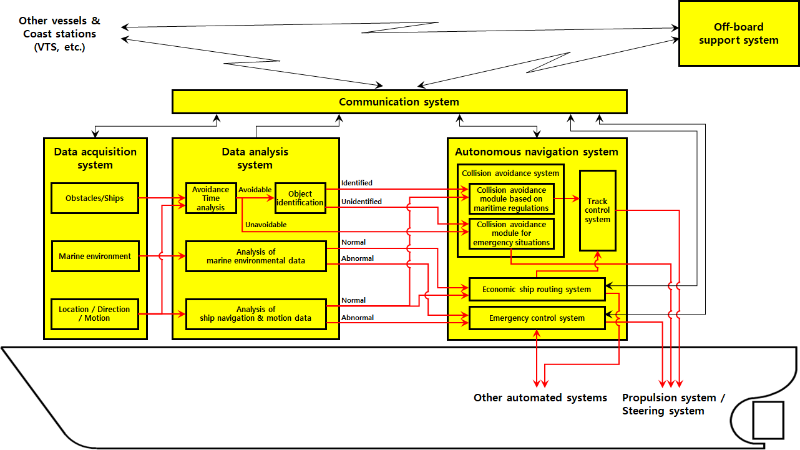
Figure 1. General configuration of autonomous systems
Table 2. Autonomy levels
|
Autonomy levels |
Data acquisition / analysis |
Decision-making |
Implementation |
|
AL 1 |
Operator / System |
Operator |
Operator |
|
AL 2 |
System |
Operator / System(1) |
Operator |
|
AL 3 |
System |
Operator(2) / System |
System |
|
AL 4 |
System |
System(3) |
System(3) |
|
AL 5 |
System |
System |
System |
|
(Note)
(1)Systems support decision making. |
|||

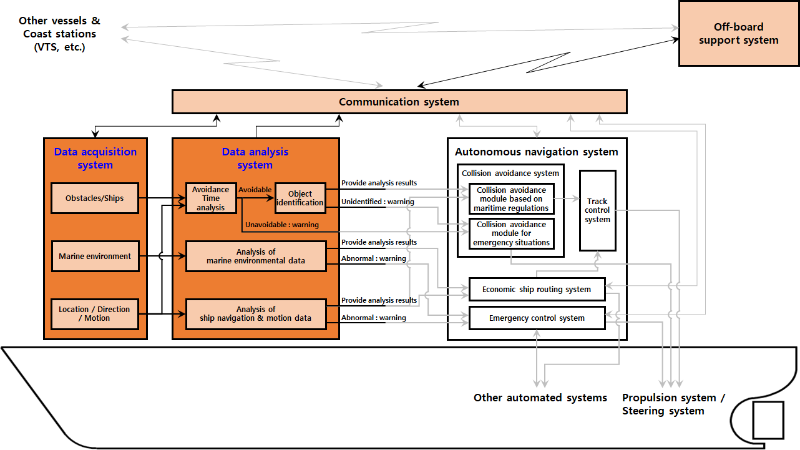
|
AL 1 |
Data acquisition/analysis |
Decision-making |
Implementation |
|
Operator / System |
Operator |
Operator |
|
|
· A ship with a system that collects data from multiple sources and integrates/analyzes them to provide operators with results that can help them make operational decisions.
|
|||
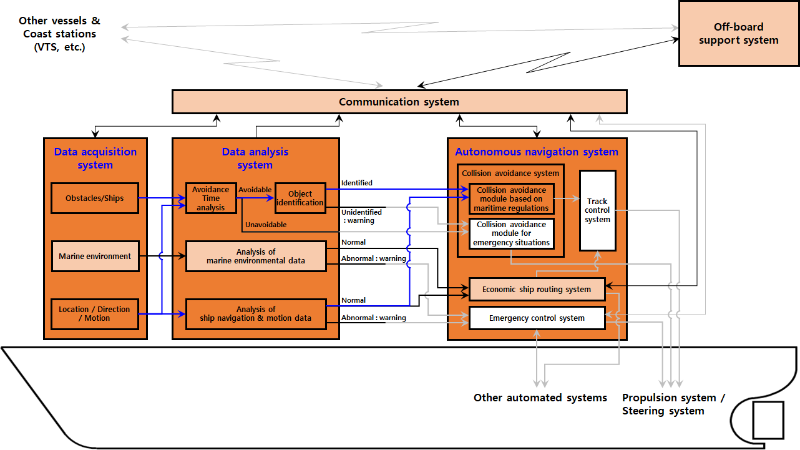
|
AL 2 |
Data acquisition/analysis |
Decision-making |
Implementation |
|
System |
Operator / System |
Operator |
|
|
·ship equipped with a system for making navigational decisions in normal situations
(Operators are responsible for the implementation.) (Give warning messages to operators.) |
|||
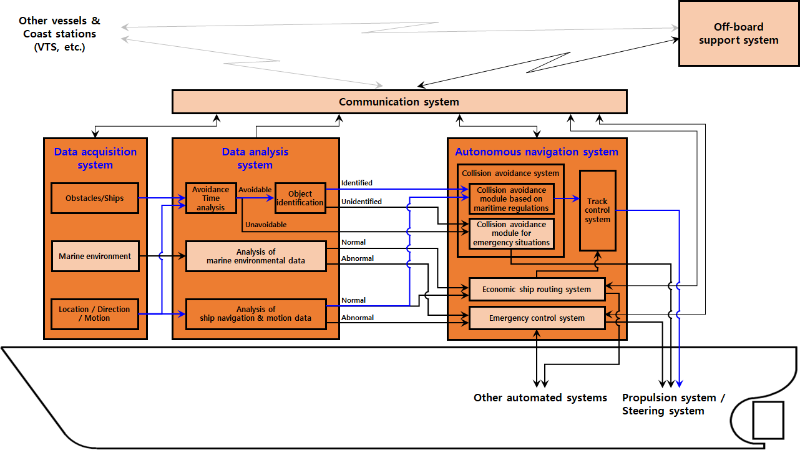
|
AL 3 |
Data acquisition/analysis |
Decision-making |
Implementation |
|
System |
Operator / System |
System |
|
|
· A ship capable of autonomous navigation under normal situations (However, operator’s confirmation for the decision is required, and if the operator’s confirmation is not preceded, the decision is withdrawn.) · Functions to support decision making and implementation under abnormal situations may be included. (In this case, as with normal situations, operator’s confirmation is required for the decision, and if the operator’s confirmation is not preceded, the decision is withdrawn.) |
|||
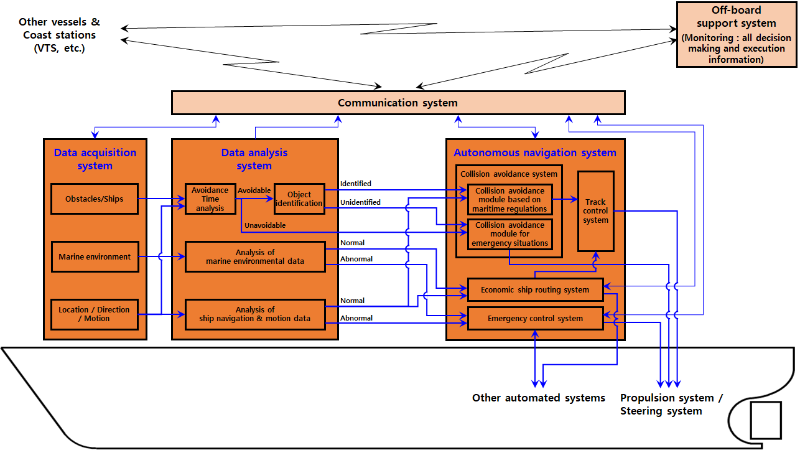
|
AL 4 |
Data acquisition/analysis |
Decision-making |
Implementation |
|
System |
System (Operator monitoring) |
System (Operator monitoring) |
|
|
· A ship with redundant configurations for system failure and being capable of autonomous navigation in normal and abnormal situations (Operator monitors all decision making and implementation information of the system.)
· Considering the system autonomy level, boarding seafarers are not needed, but minimum number of persons for monitoring / control can be boarded if there is no adequate communication system to ‘monitor all decision and implementation information for normal and abnormal situations’ and ‘support remote control in case of necessity’. (In case of unmanned operation with communication system and off-board support system, proper communication networks between 'autonomous ship & off-board support system', 'autonomous ship & other ships / coast stations’ and ‘off-board support system & other ships / coast stations' are required.)
|
|||
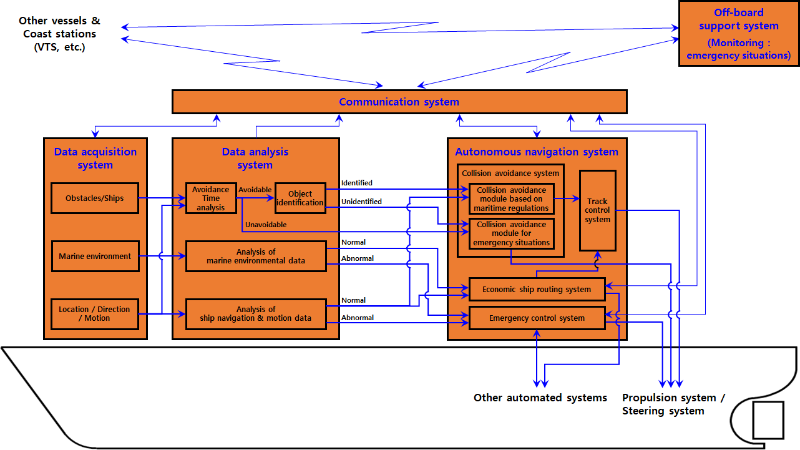
|
AL 5 |
Data acquisition/analysis |
Decision-making |
Implementation |
|
System |
System |
System |
|
|
· A ship with redundant configurations for system failure and being capable of autonomous navigation in normal and abnormal situations · No boarding seafarers required (Operators in the off-board support system monitor the
emergency situation) 'autonomous ship & other ships / coast stations’ and ‘off-board support system & other ships / coast stations' are required. |
|||
Figure 2. The systems required for autonomous ships with respect to each autonomy level (draft)


